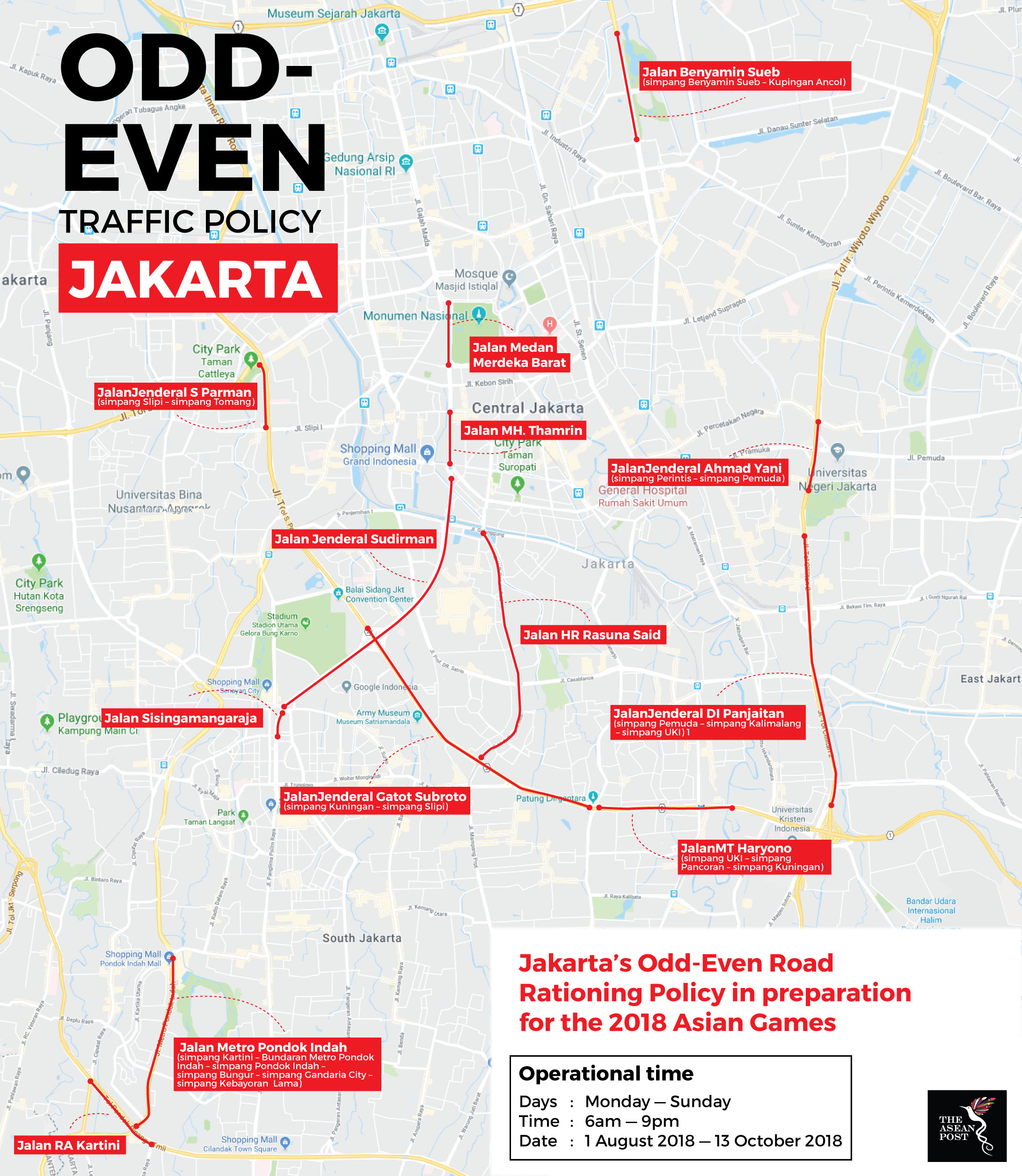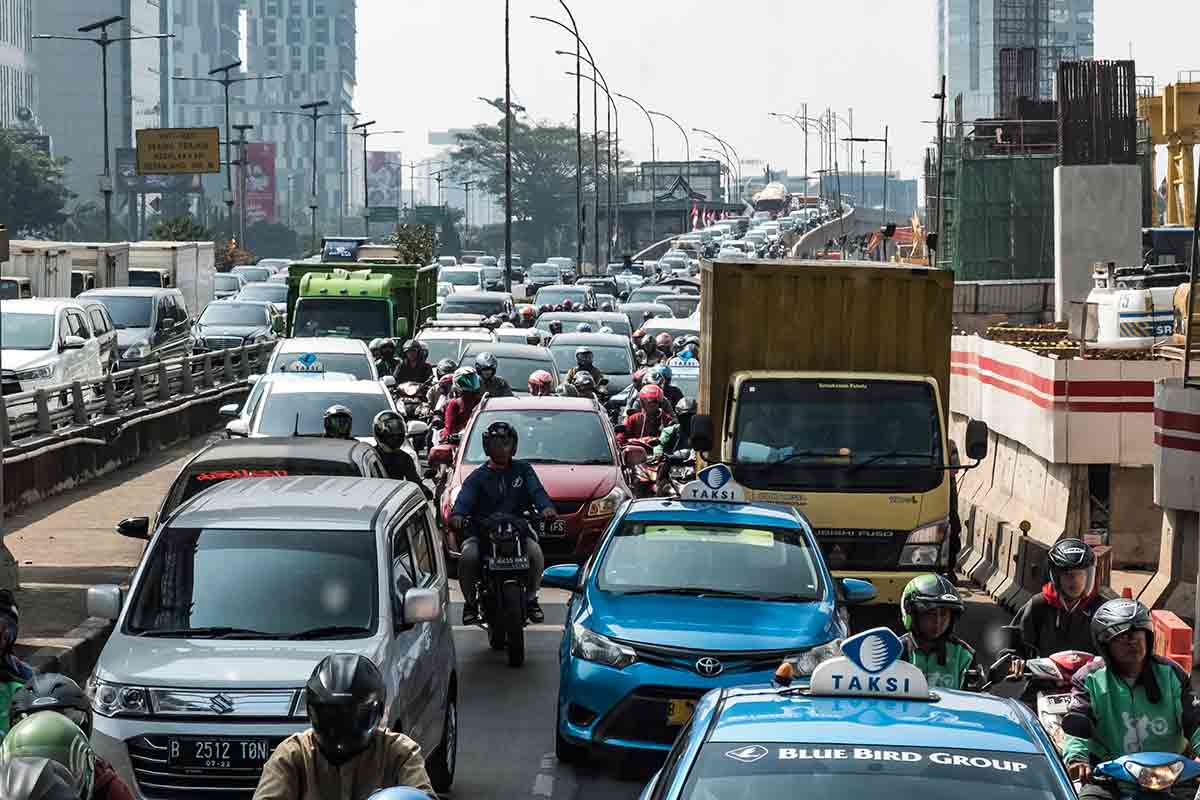Jakarta is known worldwide for its never-ending macet or traffic congestion. This year, it was ranked by the traffic information and navigation service provider Tomtom as the third city in the world most affected by traffic congestion, after Mexico City and Bangkok. Jakarta has over 13 million motorcycles and 4.4 million cars on its roads. It is estimated that more than 2.12 million trips are made from the outskirts of Jakarta into the city daily. Only around 20 percent of these trips are made using public transportation due to inefficient and unintegrated services. A study by Uber in collaboration with the Boston Consulting Group found that on average, Jakartans spend 22 days a year stuck in traffic compared to citizens of other major Asian cities who spend around 19 days.
The city has tested a number of car limitation rulings to reduce traffic blockage on key roads during peak time, including the 3-in-1 policy that allows only cars with 3 or more passengers in. In May 2016, Jakarta introduced the odd-even policy, under which only cars with license plates that end with even numbers are allowed to enter the city through key thoroughfares on even numbered dates. The same ruling goes for odd numbered licence plates on odd numbered dates.
In July 2018, drivers in the Indonesian capital of Jakarta were subjected to an expansion of the road rationing ruling in a pilot testing by the Greater Jakarta Transportation Body (BPTJ) to further limit the number of cars entering the city. The expansion also included the extension of policy operating time from covering only rush hours to 15 workday hours from 6 am to 9 pm. The new expansion targeted congestion improvement in Jakarta’s traffic in preparation for the 2018 Asian Games, to be held in the cities of Jakarta, Palembang, Bandung, Bogor, Bekasi and Subang from 18 August to 2 September, and the Asian Para Games taking place from 6 to 13 October.
Once the odd-even trial period ended, it officially came into force in August, with violators fined 500,000 rupiah (US$34.62). Local media reported that Jakarta traffic police arrested motorists found to have tampered with their license plates to evade penalties, including having two licence plates and altering the end number. On the very first day of its enforcement, more than 1,100 drivers were ticketed in five sections of Jakarta.

Source: Various.
Businesses are also making changes to accommodate the odd-even license plate limitation ruling in Jakarta. GPS navigation software Waze introduced a feature that adapted it’s routing according to the last number in the car licence plate. The feature, only available in Jakarta and Brazil, enables users to get different directions depending on dates and their licence plate numbers. At the start of the official implementation, ride-hailing company Grab also launched a specially designed algorithm to filter and match odd-even license plates to the date, time and pick-up destination. Previously, when the odd-even policy was first introduced, Jakarta’s city-owned bus operator PT Transjakarta launched premium buses to cater to commuters who were used to driving their own cars to work every day.
A positive impact
Based on data collected after the company’s July trials, the odd-even policy has proven to have a positive impact on travel times within the capital. Field evaluation by the Jakarta Transportation Department found that vehicle travel time during the odd-even trials decreased by about 12.11 percent. For specific trips, trials carried out during the month of July revealed that vehicle travel time from Kebayoran Lama to Metro Pondok Indah which usually takes around 20 minutes, came down to 15 minutes. Vehicle travel time from Sudirman to Istana Merdeka, which usually takes 30 minutes decreased to 25 minutes. The odd-even policy also impacted vehicle average speed, increasing from 20.63 kilometres per hour to 23.14 kilometres per hour.
Similarly, air quality in Jakarta also improved. While other air quality parameters are still below the quality standard, pollutants from motor vehicles decreased during the odd-even trial. Air quality monitoring by the Jakarta Environment Department showed that carbon monoxide (CO) concentrations decreased by 1.7 percent while nitrogen monoxide (NO) concentrations decreased by 14.7 percent. Total hydrocarbon content (THC) also decreased by 1.37 percent.
Clearly, the introduction of the traffic ruling converted a number of commuters to public transportation users. Six days into its official implementation and expansion, public transportation services saw a significant increase in ridership. Buses operated by Transjakarta got 34,000 more passengers on Monday, 6 August, bringing its ridership to 616,744 compared to the previous Monday. Ridership for the KRL Commuter Line experienced a 23 percent increase on 1 August, compared to Wednesday, 25 July. Operation of the new light rapid transit (LRT), which connects Kelapa Gading in North Jakarta to the Jakarta International Velodrome in Rawamangun, East Jakarta is also expected to increase public transportation use further. The LRT system is expected to begin operations on 10 August, one week before the start of the 2018 Asian Games.
The Jakarta Provincial Government has not made any decision on whether the odd-even car limitation policy will be extended beyond the Asian Games and Para Asian Games. The current implementation will conclude on 2 September. Some quarters have already proposed to make the traffic ruling permanent for Jakarta.
Should the policy be made permanent? Evidence documented throughout the implementation - during the trial period as well as official operation in August and September - will be key in the final decision-making process. To keep the momentum going, strict enforcement is essential. Next on the agenda should be the integration and further improvement of the city’s public transport services. However, the authorities should not side-line issues raised by commuters unhappy with certain aspects of the implementation of the traffic congestion policy. Whatever the final decision, an extra 22 days a year can make a positive contribution to every Jakartan’s productivity and wellbeing.
